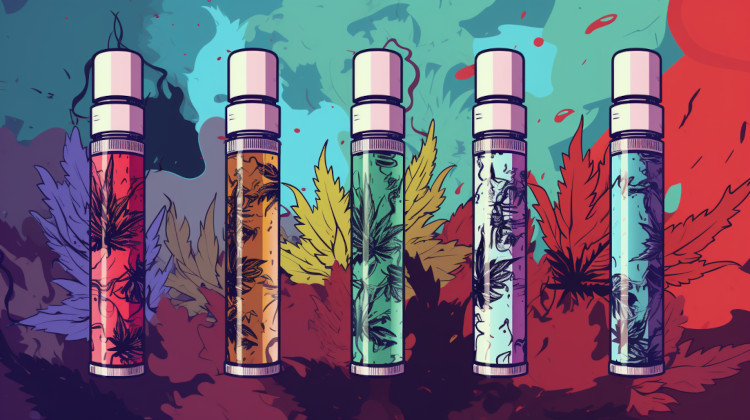In This Article
- What is a Weed Cart?
- How Long Does a Cart Stay in Your System?
- Saliva Test
- Urine Test
- Hair Test
- Blood Test
- Factors That Affect How Long the Cart Stays in Your System
- Dosage and Potency
- Frequency of Use
- Body Fat
- Metabolism
- Hydration and Diet
- Sensitivity of the Test
- Overall Health and Lifestyle
- How to Flush the Cart Out of Your System
- Stay Hydrated
- Exercise
- Eat a Healthy Diet
- Avoid “Detox” Products
- Wait It Out
- When the Vapor Clears
- References
Cannabis vaping, as an alternative to traditional smoking, has surged in popularity over recent years. Cannabis vape cartridges, commonly referred to as weed carts, have become a favored method of ingesting cannabis due to their ease of use and high potency.
However, many users wonder how long the THC from these cartridges stays in their system.
To get to the truth, it's valuable to delve into how long THC from carts can be detected in various types of drug tests, define what a weed cart is, and explore the factors influencing THC detection in one’s body.
What is a Weed Cart?
A weed cart is a pre-filled container of cannabis concentrate or oil, such as live resin, rosin, or distillate. Designed specifically for use with vape pens, carts offer a smoke-free method of inhaling cannabis.
Instead of burning the cannabis plant material, a vape pen works by heating the oil to produce a vapor, which is then inhaled. This method is not only discreet but also considered by many as a cleaner way to enjoy cannabis, eliminating the tar and many of the harmful by-products associated with traditional combustion.1
Vape cartridges, or "carts," deliver concentrated THC, leading to potent effects. Some cartridges contain over 90% THC, making them significantly more potent than traditional smoking methods. This high potency means that users should approach cautiously, especially if they are unfamiliar with their tolerance levels.
While vaping is often perceived as a cleaner alternative to smoking, THC from carts can linger in the body and be detectable in drug tests for varying durations. Understanding these detection windows is important, especially for those subject to testing.
How Long Does a Cart Stay in Your System?

Several factors play into how long a cart stays in the body, including the drug testing method and individual body chemistry. Drug tests can detect the presence of cannabis compounds long after a weed high has come and gone. Cannabis drug tests usually work by detecting THC by-products in the body, which can be stored in fat cells for weeks or months.
Saliva Test
Mainly used to detect recent cannabis use, saliva tests provide superior accuracy for short-term detection2. Unlike other tests that detect THC metabolites, oral cannabis tests detect THC in the saliva. THC can be found in saliva shortly after consumption and might remain detectable for up to 24 hours3. However, in some cases, THC can be detected up to one week after consumption.
Urine Test
Urine tests are among the most commonly used methods for detecting cannabis use, especially for employment-related drug screenings. Generally, these tests have a sensitivity level set at either 20ng/mL or 50ng/mL and boast a high accuracy rate.4 THC metabolites can be detected in urine for days or weeks after consumption. For casual users, this window might be a couple of weeks, but for heavy users, THC metabolites can potentially be detected up to 30 days after the last use.
Hair Test
THC and its metabolites can bind to the hair shaft, making hair tests a method that can detect cannabis use over a more extended period. However, one of the weaknesses of hair testing is its low sensitivity. Hair follicle tests can detect cannabis use up to 90 days prior, but the test can’t pinpoint when the consumption took place because hair rate growth differs by person.
Blood Test
THC is detectable in the bloodstream shortly after consumption, especially if cannabis is inhaled. Heavy cannabis smokers can have detectable levels of THC in their blood for up to 30 days post-consumption.5
How long THC from a vape cartridge remains in the system varies from person to person and depends heavily on the testing method. Being informed about these windows can help users make educated decisions about their cannabis consumption, especially if they anticipate undergoing drug testing.
Factors That Affect How Long the Cart Stays in Your System
The length of time THC from a vape cartridge remains detectable in the system isn't the same for everyone. Various factors, ranging from individual metabolism rates to the potency of the cartridge, play pivotal roles in this timeframe. Here, we'll outline some of the most influential factors.
Dosage and Potency
The strength of the cartridge, or how much THC it contains, may affect how long it remains in your system. Higher doses or cartridges with greater THC concentrations may take longer to fully metabolize and be eliminated due to more THC being absorbed with these products.
Frequency of Use
Occasional users may find that THC is detectable for a shorter period than for those who consume cannabis regularly. Chronic users have accumulated THC metabolites, which, over time, take longer to expel from the body.
Body Fat
THC is fat-soluble, meaning it binds to fat cells in the body.4 Individuals with higher body fat percentages might store THC metabolites longer, leading to extended detection times. The slow release of these metabolites from fat tissues, especially during periods of stress or food deprivation, can increase their concentration in the blood.6
Metabolism
As people's metabolic rates vary in digesting food, so does drug metabolism. Those with faster metabolic rates might process and eliminate THC more swiftly than others.
Hydration and Diet
While drinking water and maintaining a balanced diet can aid in the general detoxification process, they may not drastically reduce the detection window for THC. However, a well-hydrated body can facilitate faster elimination through urine.
Sensitivity of the Test
Different drug tests have varying levels of sensitivity. Factors like the sensitivity and specificity of testing methods can influence detection windows. Some tests can detect even minute amounts of THC metabolites, extending the potential detection period.
Overall Health and Lifestyle
Regular exercise can potentially speed up the metabolism of THC, especially given its storage in fat cells. However, it's worth noting that sudden bouts of intense exercise might temporarily raise THC metabolite levels in the bloodstream due to the rapid breakdown of fat.
A compelling case study by Galhenage et al. observed the detection of cannabinoid metabolites up to 102 days after abstinence in a user.2 This extended period may be attributed to factors like the extensive storage of the drug in body fat and regular consumption habits.
Numerous factors intertwine to determine how long THC from a vape cartridge remains detectable in an individual's system. Most notably:
- Frequency of use: Regular consumers may retain THC metabolites longer than occasional users.
- Body fat percentage: THC is fat-soluble, so individuals with higher body fat may store THC longer.
- Metabolism: A faster metabolism can expedite the elimination of THC.
- Hydration and activity levels: Staying hydrated and active may aid in faster detoxification.
How to Flush the Cart Out of Your System

With the rising popularity of vape cartridges in the cannabis marketplace, many wonder if there's a quick way to rid their systems of THC. While there's no magic bullet to detoxify the body from cannabis compounds instantly, several methods can speed up the process and improve the chances of passing a drug test. Here are some recommended detox strategies.
Stay Hydrated
Drinking plenty of water or teas rich in antioxidants may help the body process and eliminate THC faster through urine. Commonly used teas with these feature ingredients are milk thistle, dandelion root, peppermint leaf, and juniper berry.
Exercise
Regular cardiovascular workouts can help burn the fat cells where THC is stored and may speed up the rate of metabolism. However, avoid intense exercise right before a test, as this can release stored THC into the bloodstream, potentially raising levels temporarily.7
Eat a Healthy Diet
Consider increasing the intake of leafy greens, fruits, whole grains, and lean proteins. Consuming foods rich in antioxidants, fiber, and essential nutrients and low in sugar and fat can support the body's natural detox processes. Eating the recommended amount of daily fiber, for example, can help improve regular bowel movements, which may aid in removing THC in the body.
Avoid “Detox” Products
Some users may be tempted by the promise of quick cannabis detox products flooding the market. However, exercise caution when considering these, as this industry lacks regulation, and the products could be potentially harmful and ineffective.
While some claim to offer fast cannabis detox, their results often fall short of expectations. Laboratories have developed sophisticated methods to detect adulterants, making it increasingly challenging to outsmart drug tests.
Wait It Out
Ultimately, time is the most reliable method for THC to exit the system. If possible, consider abstaining from cannabis for several weeks or months before a test to ensure the best results.
While the body naturally processes and gets rid of THC over time, these methods may potentially help accelerate the process. Still, users should be wary of products or methods that promise instant results and prioritize their health and safety above all else.
When the Vapor Clears
Weed carts have undeniably transformed the cannabis consumption landscape, offering users a potent, discreet, and cleaner alternative to traditional smoking. However, with the increasing prevalence of drug tests, understanding how long THC from these carts stays in the system has become important for many consumers.
From saliva to blood tests, the detection window varies based on multiple factors, including the testing method, individual metabolism, frequency of use, body fat, and overall lifestyle. While various strategies like hydration, exercise, and a balanced diet can aid in the detoxification process, it's crucial to remember that no method guarantees instant THC elimination. If facing a drug test, allow ample time for THC to clear from your system or consult with a healthcare professional for guidance.
References
- Chaiton M, Kundu A, Rueda S, Di Ciano P. Are vaporizers a lower-risk alternative to smoking cannabis?. Can J Public Health. 2022;113(2):293-296. doi:10.17269/s41997-021-00565-w
↩︎ - Galhenage J, Rodrigo A. Prolonged detection of cannabis in urine of a consumer in a Forensic hospital, Victoria, Australia, up to 102 days of abstinence - A case report. Psychiatry Research Case Reports. 2023;2(1):100089. doi:https://doi.org/10.1016/j.psycr.2022.100089
↩︎ - Huestis MA. Human cannabinoid pharmacokinetics. Chem Biodivers. 2007;4(8):1770-1804. doi:10.1002/cbdv.200790152
↩︎ - Sharma P, Murthy P, Bharath MM. Chemistry, metabolism, and toxicology of cannabis: clinical implications. Iran J Psychiatry. 2012;7(4):149-156.
↩︎ - Newmeyer MN, Swortwood MJ, Barnes AJ, Abulseoud OA, Scheidweiler KB, Huestis MA. Free and Glucuronide Whole Blood Cannabinoids’ Pharmacokinetics after Controlled Smoked, Vaporized, and Oral Cannabis Administration in Frequent and Occasional Cannabis Users: Identification of Recent Cannabis Intake. Clinical Chemistry. 2016;62(12):1579-1592. doi:https://doi.org/10.1373/clinchem.2016.263475
↩︎ - Westin AA, Mjønes G, Burchardt O, Fuskevåg OM, Slørdal L. Can physical exercise or food deprivation cause release of fat-stored cannabinoids?. Basic Clin Pharmacol Toxicol. 2014;115(5):467-471. doi:10.1111/bcpt.12235
↩︎ - Wong A, Montebello ME, Norberg MM, et al. Exercise increases plasma THC concentrations in regular cannabis users. Drug and Alcohol Dependence. 2013;133(2):763-767. doi:https://doi.org/10.1016/j.drugalcdep.2013.07.031
↩︎
The information in this article and any included images or charts are for educational purposes only. This information is neither a substitute for, nor does it replace, professional legal advice or medical advice, diagnosis, or treatment. If you have any concerns or questions about laws, regulations, or your health, you should always consult with an attorney, physician or other licensed professional.




